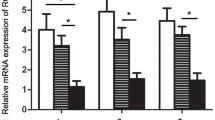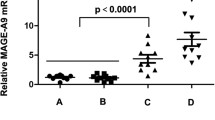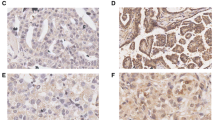Summary
In order to investigate the roles of MTA2 in the pathogenesis of ovarian epithelial cancer, the expression of MTA2 in 4 ovarian cell lines were detected by semi-quantitative RT-PCR and Western-blot assays. MTA2 expression in normal, borderline, benign and malignant epithelial ovarian tissues was immunohistochemically examined. The expression of MTA2 mRNA and protein was detected in all of 4 cell lines of ovarian epithelial cancer. The expression of MTA2 mRNA and protein was higher in strong migration cell lines than in weak migration ones. In borderline and malignant ovarian tissues tested, MTA2 staining was dramatically stronger than in normal and benign tissues (P<0.01). The expression levels in malignant ovarian tissues were significantly higher than that in borderline epithelial ovarian tissues (P<0.01). The expression of MTA2 was correlated with clinical stage, histopathological grade and lymph node metastasis. It was concluded that the high expression of MTA2 was associated with more aggressive behaviors of epithelial ovarian cancer. MTA2 provides a novel indicator of ovarian cancer.
Similar content being viewed by others
References
Zhang Y, Ng H H, Erdjument-Bromage Het al. Analysis of the NuRD subunits reveals a histone deacetylase complex and a connection with DNA methylation. Genes, 1999,13:1924–1935
Kumar R, Wang R A, Bagheri-Yarmand R. Emerging roles of MTA family members in human cancers. Semin Oncol, 2003,30(5 Suppl 16):30–37
Wu M F, Xi L, Chen Get al. Significance of expression of T lymthoma invasion/metastasis gene in ovarian cancer cells. Acta Academiae Medicinae Sinicae (China), 2003, 25(4):434–437
Futamura M, Nishimori H, Shiratsuchi Tet al. Molecular cloning, mapping, and characterization of a novel human gene, MTA1-Ll, showing homology to a metastasis-associated gene, MTA1, J Hum Genet, 1999,44(1):52–66
Luo J, Su F, Chen Det al. Deacetylation of p53 modulates its effect on cell growth and apoptosis. Nature, 2000,408(6810):377–381
Author information
Authors and Affiliations
Additional information
JI Yuxin, male, born in 1968, Doctor in Charge
This project was supported by grants from National Natural Sciences Foundation of China (No. 30300331) and National Key Basic Research Project (No. 2002CB513107).
Rights and permissions
About this article
Cite this article
Yuxin, J., Ping, Z., Yunping, L. et al. Expression of MTA2 gene in ovarian epithelial cancer and its clinical implication. J. Huazhong Univ. Sci. Technol. [Med. Sci.] 26, 359–362 (2006). https://doi.org/10.1007/BF02829576
Received:
Issue Date:
DOI: https://doi.org/10.1007/BF02829576




